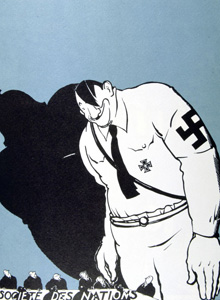Xenophon
Gone and forgotten
Ineffective but well intentioned
The League of Nations, the world's first major international organisation pledged by covenant to preserve and promote peace, provides a sombre example of how the road to war can be paved with good, but ill applied intentions.
Created on 10th January 1920, under the Treaty of Versailles and joined at some time by all nations except the United States and Saudi Arabia, the League appeared to exemplify the global mood of disgust at the barbarism of the First World War. In practice, though, it exemplified naive ineptitude, appeasing rather than confronting aggression, and the hard-headed cynicism of individual self-interest ruthlessly pursued. The crisis headlines which these characteristics produced pushed into the background the League's considerable record in child, refugee and health welfare, disarmament, drug traffic control, the abolition of slavery and other humanitarian objectives. This meritorious work was scuttled, along with the League itself, by the inability of its members to act conclusively against Japanese aggression in Manchuria (1931), Italian aggression in Ethiopia (1935-36) and the many barefaced contraventions perpetrated by Nazi Germany.
The coup de grace was administered over Ethiopia by the private Anglo-French Hoare-Laval Pact of December 1935. Previously, the League had properly condemned Italian aggression, and had imposed partial sanctions. The Pact sank all this, together with debates proposing a sanction on oil, by suggesting a solution which appeased and succoured Italy and sacrificed Ethiopia. From this display of incompetence and venality the League never recovered. As war rumbled ever louder in the future, League members began to place less and less faith in the Covenant until by 1939, it was finally abandoned.
The ghost of the League persisted through the War years. It was finally exorcised on 19th April, 1946, when it met to dissolve itself and hand its powers, functions and properties to the new United Nations, an organisation which proved rather less prone to believe that goodwill alone can make the world go round.
The League of Nations, the world's first major international organisation pledged by covenant to preserve and promote peace, provides a sombre example of how the road to war can be paved with good, but ill applied intentions.
Created on 10th January 1920, under the Treaty of Versailles and joined at some time by all nations except the United States and Saudi Arabia, the League appeared to exemplify the global mood of disgust at the barbarism of the First World War. In practice, though, it exemplified naive ineptitude, appeasing rather than confronting aggression, and the hard-headed cynicism of individual self-interest ruthlessly pursued. The crisis headlines which these characteristics produced pushed into the background the League's considerable record in child, refugee and health welfare, disarmament, drug traffic control, the abolition of slavery and other humanitarian objectives. This meritorious work was scuttled, along with the League itself, by the inability of its members to act conclusively against Japanese aggression in Manchuria (1931), Italian aggression in Ethiopia (1935-36) and the many barefaced contraventions perpetrated by Nazi Germany.
The coup de grace was administered over Ethiopia by the private Anglo-French Hoare-Laval Pact of December 1935. Previously, the League had properly condemned Italian aggression, and had imposed partial sanctions. The Pact sank all this, together with debates proposing a sanction on oil, by suggesting a solution which appeased and succoured Italy and sacrificed Ethiopia. From this display of incompetence and venality the League never recovered. As war rumbled ever louder in the future, League members began to place less and less faith in the Covenant until by 1939, it was finally abandoned.
The ghost of the League persisted through the War years. It was finally exorcised on 19th April, 1946, when it met to dissolve itself and hand its powers, functions and properties to the new United Nations, an organisation which proved rather less prone to believe that goodwill alone can make the world go round.




